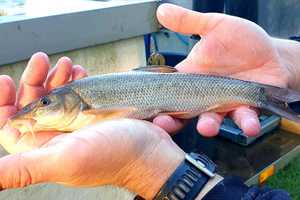Improving fish populations in the East Midlands
3,000 fish reared at the Environment Agency’s National Coarse Fish Farm have been stocked into rivers in the East Midlands.

A fish reared for release at the National Coarse Fish Farm
The fish have been used to stock the River Derwent in Derbyshire and the River Soar in Leicestershire.
2,000 juvenile barbel and 1,000 chub have been released into several locations of the River Derwent, between Draycott and Duffield, and between Cotes and Kegworth on the River Soar, to provide a welcome boost to the fish populations and angler experience in the area.
The fish stocking is part of a second year of a barbel and chub recruitment project in response to numerous reports in recent years of declining catches of juvenile species on the River Derwent and River Soar.
With angling allowed as exercise in the current lockdown restrictions, as long as anglers adhere to the rules on staying local and limit this to once a day, with no overnight fishing, and keep to social distancing, now is an excellent time to enjoy the sport.
Responsible fishing provides a good opportunity to connect with nature and feel the range of benefits doing so can bring. However, it is important to remember that a valid rod fishing licence is required and anglers must adhere to fishing byelaws and fishery rules.
Gary Briggs, Fisheries Technical Officer for the Environment Agency, said:
The East Midlands Fisheries team has been carrying out the second year of a project to improve fish populations in the region, in order to enhance angler experience.
In response to angler reports of declining catches of juvenile barbel and chub in recent years, we’ve implemented this project to assist the recovery of coarse fish populations.
To help with the effective management of future river fish populations, we have marked 2,000 barbel and 1,000 chub reared at the Environment Agency’s National Coarse Fish Farm at Calverton with blue dye near their ventral fins before stocking them in the rivers.
With the help of local angling clubs, we can then monitor the fish catch data in an attempt to understand more about the recruitment and distribution of these coarse species in our local rivers.
Anyone who catches one of the marked fish is asked to inform the Environment Agency fisheries team so they can monitor the data. Please send details, including the date and time of the catch, location, length of fish, and ideally a photo showing the blue dye mark on the fish, to: [FisheriesEMD@environment-agency.gov.uk]FisheriesEMD@environment-agency.gov.uk.
Buying a rod fishing licence is quick and easy. Licences cost just £30 for a year (concessions available) and are available from www.gov.uk/get-a-fishing-licence; by phoning 0344 800 5386; or at your local Post Office.
Notes to editors
-
All income from rod fishing licence sales is used to fund our work to protect and improve fish stocks and fisheries. This includes improving habitats for fish, reinvesting money back to facilities and clubs for anglers, tackling illegal fishing and working with partners to encourage more people to give fishing a go.
-
The Environment Agency’s National Coarse Fish Farm at Calverton remains our principal supply of coarse fish for restocking. In 2019, the farm produced 520,475 fish of 9 species, including barbel, chub, dace and grayling and 7,600,000 advanced reared larvae for restocking into rivers following pollution incidents or to help restore fish stocks in rivers recovering from poor environmental quality as well as supporting developing fisheries.